Wednesday July 18, 2012
Ranking Every Batman Movie from the 1940s Serials to 'The Dark Knight'
“The Dark Knight Rises” rises in a few days. You may have heard. A word or two on the Internet, possibly. One of the 100 reviews that are already up. Anyway I thought a look back might be in order.
I reviewed most of these Batman movies in 2008, in anticipation of “The Dark Knight,” and all of that watching and scribbling led to two articles: “Dark Knight My Ass: Why Batman descends into camp” and “The Smart Knight,” about how Christopher Nolan ensures that, at least in this iteration, the caped crusader won't descend into camp.
This is my list. Your results will surely vary. That's the fun.
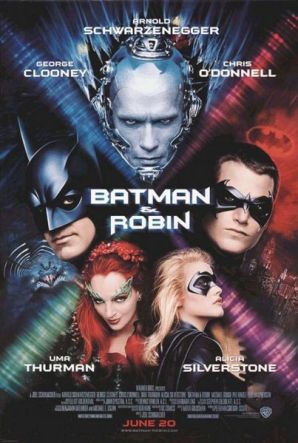 9. Batman & Robin (1997): Starring George Clooney, Arnold Schwarzenegger, Chris O'Donnell, Uma Thurman, and Alicia Silverstone. Screenplay by Akiva Goldsman. Directed by Joel Schumacher. IMDb rating: 3.6
9. Batman & Robin (1997): Starring George Clooney, Arnold Schwarzenegger, Chris O'Donnell, Uma Thurman, and Alicia Silverstone. Screenplay by Akiva Goldsman. Directed by Joel Schumacher. IMDb rating: 3.6
Yes, the costumes were awful in the 1949 serial, yes, the 1943 serial actually argues for what became our national shame, the interment of Japanese Americans. But ... plastic nipples? Alicia Silverstone? Oxbridge College? “Let's kick some ice”? Ick. Awful. This movie had a big budget, a future big star in Clooney, a future governor as the villain. But it was schlock and painful to watch. It had become a game by this point, for Hollywood and the actors rather than the characters, and the lack of seriousness seeps through every frame. The Adam West Batman movie was intentionally funny. Joel Schumacher’s “Batman & Robin” pulls off a neat trick: it turns Batman into a joke without being funny at all. It killed the franchise.
Review excerpt:
While George Clooney makes a good Bruce Wayne, playing him a little like George Clooney, he may be the worst Batman ever. Batman should be obsessed and slightly insane — why else dress up in a batsuit? — but Clooney is all ironic detachment. He’s too aware of the absurdity of this universe to live in it. When Commissioner Gordon tells him the name of the latest supervillain, he repeats the name with a kind of verbal shake of the head: “Mr. Freeze.” When Barbara bouncily introduces herself as Batgirl, he responds, “That’s not awfully PC. What about Batperson or Batwoman?” His subtext is basically How dumb is it that we wear these costumes and use these names? Michael Keaton’s Bruce could hardly wait to be Batman, whereas Clooney’s Batman, you get the feeling, can hardly wait to take off that silly costume and be Bruce Wayne.
Here’s the plot if you want it. Mr. Freeze needs diamonds to keep his cryo-suit cold, and himself alive, so he can cure his wife of her disease, Macgregor’s Syndrome, and Poison Ivy, a plant come to life, wants to rid the earth of humans, and thinks she and Freeze can do this together (“Adam and Evil,” he says), and Robin thinks Batman doesn’t trust him, and Alfred suffers from a lesser version of Macgregor’s Syndrome. During the final battle, in which Batman learns to trust Robin, Batman convinces Freeze (or Prof. Fries) to cure Alfred, and all ends well, and vaguely misogynistically, since Freeze is also put into the same Arkham Asylum cell as a scatterbrained Poison Ivy. “Surprise!” he tells her. “I’ve come to make your life a living hell!”
At the very end we get the Schumacher silhouette of Batman, Robin, and Batgirl all running toward the camera, promising new adventures that, because of the sheer stupid weight of this one, never came.
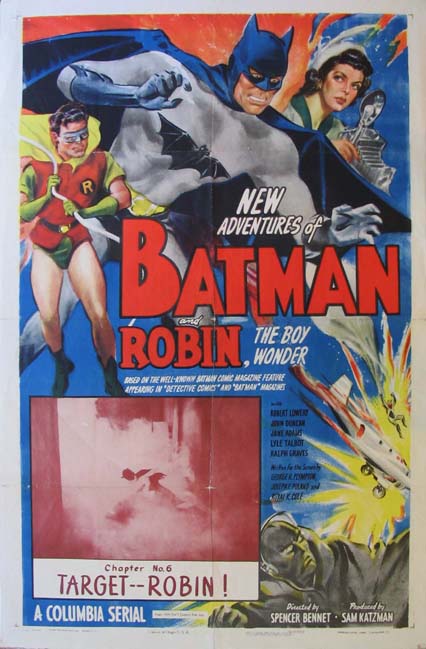 8. Batman and Robin (1949): Starring Robert Lowery, Johnny Duncan, Jane Adams, and Lyle Talbot. Written by George H. Plympton, Joseph F. Poland, and Royal K. Cole. Directed by Spencer Gordon Bennet. IMDb rating: 6.3
8. Batman and Robin (1949): Starring Robert Lowery, Johnny Duncan, Jane Adams, and Lyle Talbot. Written by George H. Plympton, Joseph F. Poland, and Royal K. Cole. Directed by Spencer Gordon Bennet. IMDb rating: 6.3
I guess the lesson here is never name your Batman movie “Batman and Robin.” Or maybe the lesson is: never include Robin—unless he's Burt Ward coming at you with his holy holies and forever pounding his fist into his hand. “Batman and Robin” is the second movie serial, six years after the first, and poor Robert Lowery is given such a lousy costume that at times he has to tilt his head up just to see through the eye slots. He's basically a glorified cop here. On the plus side, a viewing of this at the Playboy Club led William Dozier to create the “Batman” TV series of the 1960s. And that brought us Julie Newmar in a black lurex Catwoman suit.
Review excerpt:
It's six years after the first Batman serial and what’s happened? Well, the comic-relief Alfred has been replaced by the no-nonsense Alfred, and the comic-relief Capt. Arnold has been replaced by the no-nonsense Commissioner Gordon, and the no-nonsense girlfriend, Linda Page, has been replaced by Vicki Vale, who’s better for, yes, comic relief. We were more serious in the postwar world but women were still good for a laugh.
Remember when Batman used to terrorize crooks into confessing in his “bat’s cave”? No more. The batcave (possessive dropped) is now bigger, with computerish doo-dads and chemistry equipment and microscopes. It’s a workstation. Americans work, damnit. The Batmobile still isn’t parked there, though. The Cadillac he drove in ’43 has been traded in for a Mercury convertible that Bruce Wayne, living in the suburbs, parks on the street, and that Batman and Robin occassionally “borrow.” Vicki Vale confronts Batman about it in chapter 7 (“The Fatal Blast”):
Vicki: Does Bruce Wayne know you’re driving his car?
Batman: Of course.
Vicki: You know, if I didn’t know Bruce Wayne so well I’d almost think that you and he were the same man.
Batman: That’s absurd. Since you won’t tell me where you’re going I’ll tell you. You saw us on the way here, knew we were on a mission and followed us to get some pictures for your magazine.
Vicki: Any objections?
Batman: Not up until now. But this is as far as you go.The racial stereotypes are gone. Race is gone. Everyone’s white now. Everyone’s bland. What did the Japanese spy, Prince Daka, have in ‘43? Zombies and an “atom-smasher gun” that prefigured our own atom bomb. What does the Wizard have? A “remote-control machine” that has the power to bring any moving vehicle within 50 miles under its control, and a “neutralizer” that neutralizes same. He also has the power to make himself invisible. It leads to one of the funniest police dispatch calls ever. From a bored, nasal voice: “All the cars in the vicinity of 616 Main Street. Invisible man, the Wizard, there now, in phone booth in lobby. That is all.“
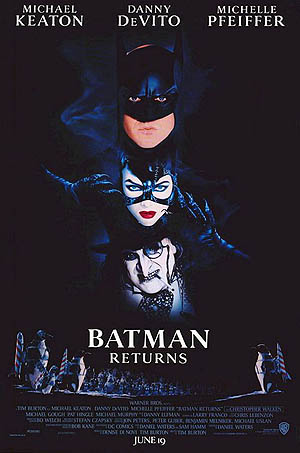 7. Batman Returns (1992): Starring Michael Keaton, Danny DeVito, Michelle Pfeiffer, Christopher Walken. Written by Daniel Waters and Sam Hamm. Directed by Tim Burton. IMDb rating: 6.9
7. Batman Returns (1992): Starring Michael Keaton, Danny DeVito, Michelle Pfeiffer, Christopher Walken. Written by Daniel Waters and Sam Hamm. Directed by Tim Burton. IMDb rating: 6.9
Batman returns? When? In the first 45 minutes of the film we get the long, drawn-out origins of both the Penguin and the Catwoman, plus the machinations of Max Shreck, and we see Bruce Wayne/Batman for, what, maybe five minutes? That’s a long time to ignore your superhero. That's why Tim Burton was the wrong guy to keep the franchise going. His entire oeuvre is about a love for the misfit — Pee Wee, Edward Scissorhands, Ed Wood — and by this point Batman is no longer a misfit (the boy who lost his parents/the vigilante called “The Bat”) but an institution (the guy the cops call when there’s trouble in town). The misfits here are the villains, particularly Oswald Cobblepot, alias the Penguin, played hammily by Danny Devito, and it’s to him that Burton showers attention and love.
Review excerpt:
In truth, this Penguin was never a good supervillain. None of them are. A good supervillain should have clear motivations, a great scheme, but you put three together and their schemes keep bumping into and sidetracking each other. So Max Shreck needs to install a puppet mayor for his faux power plant and chooses, for his candidate...the Penguin? If he could get this ugly, grunting, bloated creature elected, couldn’t he could get anyone elected? The Penguin, for his part, wants to murder every first-born son of Gotham, but allows his wishes to be sidetracked for a mayoral run that, of course, falls flat.
And what of the Catwoman? As Selina Kyle, mousy secretary, she’s both browbeaten and then killed by Max Shreck, so you’d think she’d want to get Shreck, and, yes, that eventually becomes her scheme, but getting him too quickly wouldn’t serve the two-hour film. So first she goes after men in general and then Batman in particular. Why Batman? Is it because, near the beginning of the film, after he saved her from a marauding member of the Circus Gang, he didn’t stop to talk to her? Here’s what’s worse: In that scene, he did pause, he did stand there, while chaos reigned, so she could utter her line: “Wow, the Batman. Or is it just ‘Batman’?” It’s a moment that only makes sense in our universe, where Keaton and Pfeifer are the stars of the film, rather than in their universe, where she’s just a mousy secretary and Batman still has villains to battle. But he pauses, then walks away, allowing Selina to feel sorry for herself: “Wow, that was very brief. Just like all the men in my life. What men?” Buck up, honey.
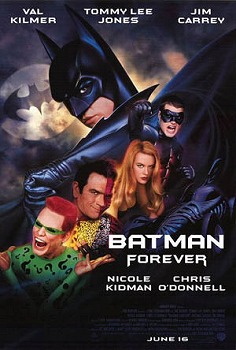 6. Batman Forever (1995): Starring Val Kilmer, Tommy Lee Jones, Jim Carrey, Nicole Kidman, Chris O'Donnell. Written by Lee Batchler, Janet Scott Batchler, and Akiva Goldsman. Directed by Joel Schumacher. IMDb rating: 5.4
6. Batman Forever (1995): Starring Val Kilmer, Tommy Lee Jones, Jim Carrey, Nicole Kidman, Chris O'Donnell. Written by Lee Batchler, Janet Scott Batchler, and Akiva Goldsman. Directed by Joel Schumacher. IMDb rating: 5.4
At least we begin this thing in medias res. At least we get a bang-bang beginning: Batman and a guard locked in a bank vault that is slowly filling with acid and hoisted in the air by Two Face. Batman escapes that trap but finds himself being pulled around Gotham the way that Jackie Chan was pulled around Kuala Lumpur in Police Story III: Supercop.
Unfortunately, after all this, we get dialogue. Review excerpt:
Bruce Wayne is one effed-up dude. His parents were killed in front of him so he’s dedicated his life to dressing up in a bat suit and prowling the night in search of crime. But Batman Forever wants to clean him. It wants to psychoanalyze and cure him. And it does. By the end of the film his repressed memories are found, his split personality is tied together, and he changes from a Batman who must fight crime to one who chooses to fight crime. I’m OK, Batman’s OK.
Both supervillains go way over-the-top. They compete to see who can chew the most scene. Meanwhile, Nicole Kidman reads half her lines like she’s in a 1-900 ad. At one point, the batsignal appears in the sky, but it’s not Commissioner Gordon waiting for Batman. Dr. Chase Meridian (Kidman), ever the professional, is wearing a low-cut dress over a long black coat:
Batman: The batsignal is not a beeper.
Chase: Well, I wish I could say my interest in you is...purely professional.
Batman: You trying to get under my cape, doctor?
Chase: A girl can’t live by psychoses alone.
Batman: The car, right? Chicks love the car.Believe it or not, it gets worse:
Batman: We all wear masks.
Chase: My life’s an open book. You read?
Batman: I don’t blend in at a family picnic.
Chase: We could try. I’ll bring the wine... (removes coat, revealing bare shoulders)...you bring your scarred psyche.
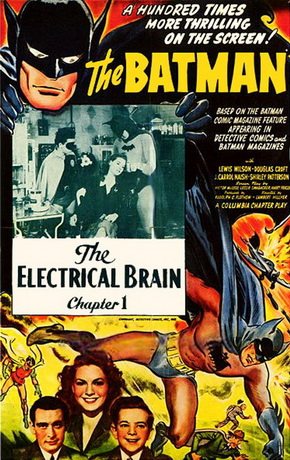 5. Batman (1943): Starring Lewis Wilson, Douglas Croft, J. Carrol Naish, Shirley Patterson. Written by Victor McLeod, Leslie Swabacker, Harry L. Fraser. Directed by Lambert Hillyer. IMDb rating: 6.8
5. Batman (1943): Starring Lewis Wilson, Douglas Croft, J. Carrol Naish, Shirley Patterson. Written by Victor McLeod, Leslie Swabacker, Harry L. Fraser. Directed by Lambert Hillyer. IMDb rating: 6.8
This thing is archeology work. It's like finding a lost city. It's not only the first screen presentation of Batman but only the second live-action serial starring a Golden Age superhero (after Capt. Marvel). You watch in amazement as Batman and Robin tool around in a black Cadillac, with Robin driving, or Batman putting bat stickers on the foreheads of criminals, like some low-rent Zorro. There's also that vaguely British accent. We're a long way from Christian Bale's growl.
Review excerpt:
The chief problem with this 15-episode serial isn’t the low-budget effects (Columbia serials were notoriously cheap), nor its racism (the chief villain is a Japanese spy during WWII), but the form itself, the serial form, which requires cliffhangers. Since the lives of Batman and Robin hang by a thread at the end of every episode, and since the serial wasn’t budgeted for a lot of extras, “America’s greatest crimefighter,” as Batman is called in the narrative intro, ain’t that great a fighter. Among the cliffhangers:
- Two crooks throw Batman, arms and legs thrashing, off a roof.
- Three crooks toss Batman, arms and legs thrashing, down an elevator shaft.
- A crook tosses a stick at Batman’s head, knocking him unconscious on a railroad trestle.
- A gangplank is dropped on Batman.
- He drives a car off a bridge.
- He gets trapped in a fire he sets.
Worse, you see Batman getting outpunched by two guys. One time it was even one guy. I’m talking an ordinary guy in suit and fedora. You think: What’s the point of putting on cape and cowl if you can’t take one guy?
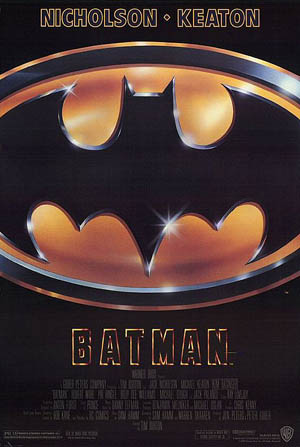 4. Batman (1989): Starring Michael Keaton, Jack Nicholson, Kim Basinger, Robert Wuhl. Written by Sam Hamm and Warren Skaaren. Directed by Tim Burton. IMDb rating: 7.6
4. Batman (1989): Starring Michael Keaton, Jack Nicholson, Kim Basinger, Robert Wuhl. Written by Sam Hamm and Warren Skaaren. Directed by Tim Burton. IMDb rating: 7.6
I still remember how thrilling it was seeing that first ”Batman“ trailer in February 1989. I'd gone to ”Dirty Rotten Scoundrels,“ starring Steve Martin and Michael Caine (the future Alfred, interestingly), and suddenly I was watching this ”WHAT ARE YOU?“ ”I'm Batman“ thing. Wow wow wow. The sets, the costumes, the dark lighting, the ominous music — everything looked perfect. And suddenly I didn’t want to see ”Dirty Rotten Scoundrels.“ Suddenly I had a need, a visceral need, to see Tim Burton’s ”Batman.“ I’m not sure why. I hadn’t collected comics for 10 years. I was getting ready to go to grad school, but still, opening day, I dragged my girlfriend to the first performance at the St. Anthony Main theaters in Minneapolis. I had to be there. I had to see it.
And?
I was kind of disappointed. I still am. Review excerpt:
I love the way Michael Keaton plays Bruce Wayne. We usually see him as a socialite, a playboy, and I suppose you could say he is here, too (he beds Vicki Vale pretty quickly), but it’s a loose, complex take on Wayne. Keaton plays him as if he’s perpetually distracted, as if he’s always thinking about something else. When Vicki Vale joins him at Wayne Manor for dinner and asks whether he likes the room they’re in — which is cold and lifeless — he says, “Oh yeah,” then seems puzzled and looks around. “You know, to tell you the truth, I don’t think I’ve ever been in this room before.” The ‘40s serials played Wayne a la Zorro — bored and fey — while Adam West, Val Kilmer and George Clooney played him as straight as they played Batman. Only Christian Bale, who spends most of Batman Begins as Bruce Wayne, and who then performs the role of drunk playboy for the people of Gotham, comes close to something as interesting as Keaton’s performance, but I’d still go with Keaton. It’s as if this Bruce Wayne is using all his intensity, all his concentration, for Batman, leaving none for himself. You could say he’s never really there as Bruce Wayne because he’s not Bruce Wayne. He’s Batman.
But the plot of the movie keeps fraying. In Vicki Vale's apartment, where Bruce almost tells Vicki his secret identity, he finally discovers that the Joker is Jack Napier who, as a young man, killed his parents. In other words, this is what his entire life has been building towards — revenge on this one man — but the film, rather than barreling forward, gets distracted. It gives us Vicki in the batcave. Alfred has brought her there without consultation. And rather than Vicki saying something like, “Oh my god, you’re Batman!” we get a spin on a conversation men and women have been having for-fucking-ever. Think about it. This is the first time we’ve ever seen a woman confronting Bruce Wayne in the batcave and these are the first words we hear her say: “Tell me if I’m crazy, but that wasn’t just another night for either of us, was it?”
Talk about a downer.
 3. Batman Begins (2005): Starring Christian Bale, Liam Neeson, Katie Holmes, Michael Caine, Morgan Freeman. Written by David S. Goyer and Christopher Nolan. Directed by Christopher Nolan. IMDb rating: 8.3
3. Batman Begins (2005): Starring Christian Bale, Liam Neeson, Katie Holmes, Michael Caine, Morgan Freeman. Written by David S. Goyer and Christopher Nolan. Directed by Christopher Nolan. IMDb rating: 8.3
The last time we saw a cinematic Batman, he was saddled with Robin, Batgirl, plastic nipples, camp villains, and a lead actor who emanated the absurdity of playing a cape crusader. “Batman Begins” is, as the kids say, way better. It’s dark and moody and realistic. So why is it unsatisfying?
I blame the relentless direction of Nolan, who pushes the story along with the same speed and tone throughout. Every scene has the same weight, the same growling intensity: dining, talking, fighting, falling, fighting again. There are no peaks and valleys. It’s all arias. You want to take a breath.
There’s also a problem with the villains.
Review excerpt:
We don’t see Batman until an hour into the movie. The first hour is all about training to become Batman so Bruce can take on the Carmine Falcones of the world.
Falcone (Tom Wilkinson), the leader of the Gotham underworld, is a nasty piece of work. He’s the one who has Joe Chill killed; and he’s the one who sends Bruce on his mission. He tells him:
You think because your mommy and your daddy got shot you know about the ugly side of life, but you don't. You've never tasted desperate. You're Bruce Wayne, the Prince of Gotham. You'd have to go a thousand miles to meet someone who didn't know your name. So don't come down here with your anger, trying to prove something to yourself. This is a world you'll never understand. And you always fear what you don't understand.
That’s good. And it’s why Bruce goes on his seven-year trek: to find those who don’t know him; to understand the underworld; to face his fears. He does all of this with the help of Ra's al Ghul. And he brings it all back to Gotham to face Carmine Falcone ... who is dispatched in like two minutes of screentime.
Turns out Falcone, for whom we’ve waited an hour, is just a pawn. The greater power lies with Dr. Jonathan Crane (Cillian Murphy), AKA the Scarecrow, who, with his magic powder and scary mask, makes Falcone mad. But Crane, too, is just a pawn. The greater power lies with ... wait for it ... Ra’s al Ghul, the man who trained Bruce Wayne in the first place. The man who made him Batman.
So we wait an hour for an encounter with Carmine Falcone, and, poof, he’s gone. The problem? Falcone is more interesting than Ra’s al Ghul, too. That speech above is brilliant. It’s savvy. Ghul? He spews vaguely eastern nonsense.
- “The training is nothing!” he tells Bruce Wayne ... as he trains him.
- “What you really fear is inside yourself. You fear your own power.”
Can I answer that one? I’m not sure about Bruce, but the last thing I fear is my own power. Probably the last thing you fear, too.
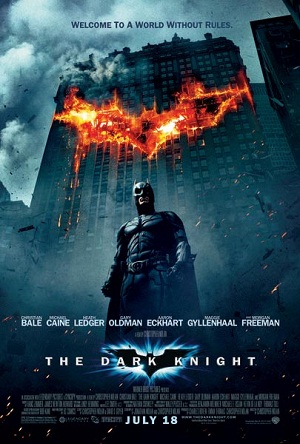 2. The Dark Knight (2008): Starring Christian Bale, Heath Ledger, Aaron Eckhart, Maggie Gyllenhaal, Michael Caine. Written by Christopher Nolan, David S. Goyer, Jonathan Nolan. Directed by Christopher Nolan. IMDb rating: 8.9
2. The Dark Knight (2008): Starring Christian Bale, Heath Ledger, Aaron Eckhart, Maggie Gyllenhaal, Michael Caine. Written by Christopher Nolan, David S. Goyer, Jonathan Nolan. Directed by Christopher Nolan. IMDb rating: 8.9
For most fanboys this is the pinnacle of not only Batman movies, and not only superhero movies, but all movies. It's got an 8.9 rating on IMDb.com, which makes it the 8th greatest movie of all time: just behind ”Schindler's List“ and five up from ”Seven Samurai.“ It's just not for me. It's good but.... Nolan's direction is as relentless here as in ”Batman Begins,“ and it bugs me. The Joker is impossibly everywhere in the second half of the movie, and it bugs me. The fact that Batman knew, truly knew, that the ferryboat battle would bring out the best in Gotham's citizens rather than, once again, their worst, bugs me. How did he develop such faith in Gotham? Isn't that why he's Batman in the first place? Because he knows people are no damn good? Isn't that why he's dark and brooding and wants to instill fear?
Review excerpt:
This is a tough movie to be Batman. In “Batman Begins,” he’s proactive, stalking crooks in the night. Here, he’s back on his heels. He’s reacting more than acting. He’s taking punches.
Is he slower in this one? He was such a ninja in the first movie that both criminals and moviegoers could barely see him. People complained. That last fight with Ra’s al Ghul on the train was like a battle of shadows, but, ninja-wise, it made sense. Here, Batman’s not only not a ninja, he’s as stolid as Rocky Balboa in the 11th round.
And what's with his friends? After Batman’s first encounter with the Joker, when Bruce Wayne says, “They crossed a line,” Alfred immediately pipes up, “You crossed the line first, sir. You squeezed them, you hammered them to the point of desperation.” Thanks, bro. After Rachel Dawes dies and and Bruce sits despondent over his role in all of this—in inspiring not good but madness—Alfred bucks him up by telling him, “You spat in the faces of Gotham's worse criminals. Didn’t you think there might be some casualties?” Thanks for the shoulder, bro.
Poor dude can’t have a conversation with anyone without it turning into some part of the film’s philosophical treatise. I love me some Michael Caine but almost everything Alfred says is in this vein. Harvey Dent, too. “You either die a hero,” he says during a casual dinner, “or you live long enough to see yourself become the villain.” When I first heard it, before I knew that Harvey would die a hero and Batman would endure as a villain, it felt false to me. It rang loudly and off key. It announced itself.
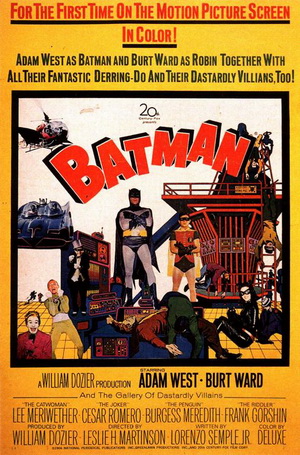 1. Batman (1966): Starring Adam West, Burt Ward, Lee Meriwether, Cesar Romero, Burgess Meredith, Frank Gorshin. Written by Lorenzo Semples, Jr. Directed by Leslie H. Martinson. IMDb rating: 6.3.
1. Batman (1966): Starring Adam West, Burt Ward, Lee Meriwether, Cesar Romero, Burgess Meredith, Frank Gorshin. Written by Lorenzo Semples, Jr. Directed by Leslie H. Martinson. IMDb rating: 6.3.
In robotics and 3-D animation, they call it ”the uncanny valley.“ The closer robots and drawings come to looking like us the more uncomfortable we become with them. Maybe I have a similar problem with Batman movies. The more realistic they make them, the more absurd they seem. Because once you make Batman as real as possible, you're still left with a dude with no superpowers who prowls the night in search of crime ... dressed like a bat. That's a tough hump to come over.
Which is why, in the end, Adam West's ”Batman“ tops my list. It satrizes, and satrizes well, not only what's absurd about Batman but what's absurd about post-WWII America. To all the other Batman movies, particularly Chris Nolan's, and to all the fanboys out there who will surely object to this list, I have just one question: Why...so...SERIOUS???
Review excerpt:
You really don’t know how funny ”Batman: The Movie“ is until you watch it after watching the 1940s Batman serials.
Batman, who started out as a vigilante, is here not only an establishment figure but the establishment figure. Cops put their hats over their hearts when the batcopter flies by. During a press conference Batman feeds the press misinformation as easily as any politician. The disappearing yacht? “Nonsense. How can a yacht simply disappear?” The exploding shark? “Doubtless an unfortunate animal who chanced to swallow a floating mine.” He and Robin are, according to Commissioner Gordon during that same press conference, “fully deputized agents of the law,” to which Robin responds, fist pounding palm, “Support your police! That’s our message!”
This Batman is almost terrifying. Enamored of a Miss Kitka (Catwoman in disguise), who is “threatened” by the Riddler, Robin asks what he’ll do if the Riddler makes a move, and he responds, lingering over each word, “I’ll bash him brutally.” He tells the movies’ four supervillains, “I swear if you’ve harmed that girl, I will kill you all. I will rend you limb from limb!” He’s so filled with his own self-importance he’s virtually a law unto himself.
The film satirizes everything: From the labels around the batcave (ACCESS TO BATCAVE VIA BATPOLE) to the facile way Batman and Robin solve the Riddler’s riddles. What has yellow skin and writes? “A ball-point banana!” Robin says. What people are always in a hurry? “Rushing? Russians!” Robin says, before figuring it out:
Robin: I’ve got it! Someone Russian is going to slip on a banana peel and break their neck!
Batman: Right, Robin! The only possible meaning.But it’s our own cultural pomposity and self-importance that is skewered the most. At the end, after rehydrating the nine members of the U.N. Security Council, all of them are suddenly speaking a different language than their native language, and Batman says, “Who knows, Robin. This strange mixing of the minds may be” ... and here he lifts his eyes up toward the sky... “the greatest single service ever performed for humanity.”
Could you do a film like this today or do we take our superheroes, and ourselves, too seriously?
I'll post a review of “The Dark Knight Rises” this weekend. Same bat-time, same bat-blog.
Baseball's Active Leaders, 2023
What Trump Said When About COVID
Recent Reviews
Everything Everywhere All at Once (2022)
Black Panther: Wakanda Forever (2022)
Doctor Strange in the Multiverse of Madness (2022)
Spider-Man: No Way Home (2021)
The Cagneys
A Midsummer Night's Dream (1935)
Something to Sing About (1937)
Angels with Dirty Faces (1938)
A Lion Is In the Streets (1953)
Man of a Thousand Faces (1957)
Never Steal Anything Small (1959)
Shake Hands With the Devil (1959)







